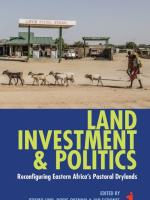Pastoralists occupy smallholder land in Kenya
In recent years, the pastoral drylands of Eastern Africa have faced unprecedented circumstances as large-scale investments have lead to reconfigurations of the economic and political landscape. For better as for worse, such reconfigurations have significantly affected people's dependence on natural resources and created winners and losers in a region that already battles with inequality.
Researcher Marie Gravesen explores one dimension of how these reconfigurations take shape in Laikipia County in Kenya. Here, land issues have often developed when a lack of state presence has enabled opportunistic interference. In the Independence years in the 1960s and 1970s, this was the case when the new political elite took advantage of the plans to transfer the former colonial ranches into smallholdings for the African population. By forming land-buying companies, the political elite could make promises of land allocations for smallholder farmers in exchange for their votes. But as soon as a land-buying company was formed, the piece of land acquired, the smallholders’ payments collected and their votes of gratitude had manifested into political support in general elections, then the political patron seemed to have lost interest in finalizing the land transactions and securing tenure security for the voters. Without an individual title deed the smallholders could not get bank loans to invest in their land and police protection against trespassing was limited. In effect, they had moved out of state space and instead come under the jurisdiction of institutions that did not fully represent them. Still today, after more than 40 years, many smallholders continue to live with this insecurity. As such, the land-buying companies are based on elite structures, imposing authority upon smallholders as twilight institutions within a space of jurisdiction that is out of reach from the state.
To complicate the situation further, many had acquired land for investment purposes and were not interested in settling. Today, this has created vast areas of seemingly vacant land that has attracted pastoralists from frontier lands - areas that are under pressure from climate change and land grabs from large-scale investments. Without sufficient grass, the pastoralists are forced to graze illegally on the settled smallholders’ fields. This leads to violent confrontations, in which the police are reluctant to get involved because it is strictly speaking not yet the smallholders’ private property.
The future of these contested lands in Laikipia is highly uncertain. Today, everyone acts opportunistically simply because they have to. For the pastoralists, it is not an option to refrain from settling on land belonging to others, and graze livestock illegally since their cattle may die if they do not do so. On land at the margins, where relatively few farmers are settled, the seemingly vacant land is abundant, which makes the fights worthwhile for the pastoralists. For the settled smallholders’, it is not an option to wait for the title deed before settling, since waiting may leave them without an income for decades. To politicians, it is necessary to manoeuvre social economies, for instance by buying land to secure votes as they did in the Independence years. Without such political opportunism the politician would not last long in Kenyan politics. So, as long as state authorities do not get involved and company offices are securely located out of reach from frustrated shareholders, the directors can continue their practice of opportunistic inaction.
The book chapter appears in Jeremy Lind, Doris Okenwa, Ian Scoones’ edited book ‘Land, Investment & Politics: Reconfiguring Eastern Africa's Pastoral Drylands’ that was published by James Currey in May 2020.
DIIS Eksperter

